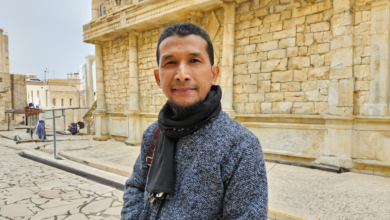
Reaching solemn prayer
There are several urgency of prayer in Islam. First, prayer is the pillar of religion.
The Messenger of Allah (saw) said, "The subject of the matter is Islam, the pillar is prayer, and the culmination of the matter is jihad." (Hadith narrated by Tirmidhi number 2616 from Mu'adz ra)
Second, prayer is the first act of reckoning. As the Messenger of Allah (saw) said, "Indeed, the first thing a servant will be judged for on the Day of Resurrection is prayer. If his prayer is good, he will get good luck and safety. If his prayer is broken, he will regret and lose…” (Hadith narrated by Abu Dawud number 864, Ahmad 2:425 from Abu Hurairah ra)
Third, prayer is the last lost bond of Islam. The Messenger of Allah (saw) said, “The ties of Islam will be broken one by one. Every time it breaks, humans hang on to the next rope. The earliest to break is the ruling and the last is prayer.” (hadith narrated by Ahmad 5:251 from Abu Umamah)
Fourth, prayer is the last will of the Prophet Muhammad. As he said, "Keep the prayer, keep the prayer and your slaves." (Hadith narrated by Ahmad 6:290 from Umm Salamah ra)
Fifth, if the neglect of prayer makes it easy to be tempted by lust. This warning was conveyed by Allah through His word, "Then there will come after them a bad substitute who wastes prayer and follows his lust. Then they will be in trouble." (Surah Maryam verse 59)
Sixth, prayer is obligatory on Jibril (as). It is only the prayer that the Prophet Muhammad (saw) received his directive command of when he was undergoing Isra and Mi'raj.
Seventh, prayer is irreplaceable. Whoever falls asleep or forgets to pray, it is obligatory for him to make up for it.
The Prophet Muhammad said, "Whoever forgets to pray, let him pray when he remembers. There is no obligation for him other than that." (Hadith narrated by Bukhari number 597 and Muslim number 684)
Likewise during war, prayer should not be abandoned.
But the question is, when was the last time we prayed solemnly? Is it in the open, when you are sad or suffering, or when you pray for a dead body?
Then what about our daily prayers? Can you be solemn, or can you not be solemn and often remember other things outside of prayer?
As an initial reflection, let's meditate on the following:
- Among us, how many people pray?
- Of those who pray, how many pray on time?
- Of those who are on time, how many are always in congregation?
- Of those in congregation, how many are solemn in their prayers?
Allah says:
الصَّلَاةَ الْفَحْشَاءِ الْمُنْكَرِ
"Verily, prayer prevents from (deeds) vile and evil." (Surat al-Ankabut verse 45)
But in fact, there are many who pray but there are still many who commit immorality. There are also those who have prayed but are still often immoral. Why did that happen? Because the prayer is not solemn!
In fact, all agree that:
- Prayer is obligatory (Surah An-Nisa': 103).
- Prayer is the key to heaven (hadith narrated by Tirmidhi from Jabir bin Abdullah ra).
- Prayer is the light of the believer (Hadith narrated by Ibn Majah from Anas bin Malik ra).
- Prayer is the first deed that is judged in the hereafter (hadith narrated by al-Hakim).
- Prayer is the difference between disbelievers and believers (Hadith of Muslim History from Jabir ra).
- Prayer in congregation is more important (Hadith History of Muttafaq 'alaihi from Ibn Umar).
4 Steps to Reach Sincere Prayer
First, make prayer a necessity. There is a difference between obligation and necessity.
- Obligations: disturbed by the arrival of prayer times. Needs: waiting for prayer time.
- Obligations: tend to procrastinate. Needs: trying to be on time.
- Responsibilities: want to finish quickly. Needs: want to linger.
- Obligations: hard to reach solemnity. Needs: trying to make efforts to reach solemnity.
We also have to know the function of prayer. Because, if you don't know, you don't love. Namely:
- Optimizing the role of our ubudiyah (servitude) to Allah SWT (Surah Adz-Dzariyat verse 56).
- Taqwiyatun-nafs (strengthening of the soul)–(Surah Muzzammil verses 1-5).
- Preventing evil (Surah Al-Ankabut verse 45).
- Means of i'tizaz (increasing self-esteem and pride).
- Peace of mind and rest.
- Tarbiyah dzatiyah and shakhsiyah (self and character formation).
Second, knowing the core tips to reach solemnity. For that we must know, why should prayer be solemn?
Among them:
- Because the lucky ones are the humble believers (Surah Al-Mu'minun verse 1-2)
- So that we are not harmed and hypocritical (Surat Al-Ma'un verse 4-5).
- Khusyu 'aborts sins (HR Muslim from Zaid bin Kholid).
- لى لا ا له ا
- So that the reward for our prayers is optimal (hadith narrated by Abu Dawud from Amar bin Yasir). (إن الرجل لينصرف ا له لا لاته. ا ا ا، ا، ا، ا، لثها، ا)
- Because the devil is always tempting (hadith narrated by Bukhari Muslim from Abu Hurairah). لم ان العاص ال لت: ا ل الله الشيطان، ال وبين لاتي اءتي لبسها لي، ال لى الله ل :
The following are tips for being solemn in prayer:
- Istihdhar al-qalb (concentration). Namely, empty the heart of things that should not interfere and invite him to talk. The factor that causes the presence of the heart is himmah (main concern).
- Tafahhum li ma'nal kalam (knowing the meaning of pronunciation). Tafahhum (understanding) the meaning of the prayer reading lafazh. Always think and direct the mind to know the meaning. لموا ا لون
- Ta'dzhiim lillah (respect and exaltation). Ta'zhim (respect) that is born of ma'rifat for the glory and majesty of Allah (will give birth to a sense of surrender/istikanah) and ma'rifat will humiliate oneself (will give birth to a sense of helplessness/inkisar).
- Roja wal khouf (hopefully anxious). Feelings of hope and anxiety about whether prayer will be granted or not so that it encourages more careful, solemn, and guarding from things that interfere with solemnity ا ل اللھ المتقین
- Dzkirul maut (remembering death). Remember to die in your prayers, because if people remember death in their prayers, they will improve their prayers. Pray like a person who is not sure he will be able to do other prayers. (Sahih Albani, Assuyuti) "If you are standing in your prayer then pray as if you are saying goodbye." (HR Ahmad)
Third, carry out the sunnah that supports solemnity. Namely, paying attention to what to do before going to the mosque, when stepping into the mosque, and when in the mosque.
- Before going to the mosque:
- Bersiwak (hadith narrated by Muslim)
لولا لى لمرتهم السواك
- Avoiding annoying odors (hadith narrated by Bukhari from Jabir), plus wearing perfumes. (من ل الثوم البصل الجوع ل ا).
- Avoid patterned clothes (Hadith narrated by Bukhari Muslim from Aisha).
- Not holding back (hadith narrated by Muslim from Aisyah ra).
- Prioritize the food that has been served (hadith narrated by Muslim from Ayesha).
- Not in a sleepy state (hadith narrated by the Jama'ah from Aisyah ra).
- When stepping into the mosque:
- Pray when you leave the house.
- Leave quietly.
- Take short steps and pray.
- Enter the mosque with your right foot and pray.
- Inside the mosque:
- Prayer tahiyatul mosque before sitting.
- Not much to say about the world.
- Not buying and selling.
- Setting up prayer barriers.
- Dhikr and prayer after prayer.
- Sunnah prayers before or after.
Fourth, pay attention to the aspect of spiritual awakening. Given that we still have a long way to go, we must:
- Remind each other.
- Motivate each other.
- Advise each other
Delivered by Ustadzah Hj. Siti Hafidah Ayub Asnawi, Lc., MA., during the Halaqoh study on Tuesday for Female Expatriates on August 10, 2021.
>>>This study was conducted online using the Zoom application and broadcast LIVE on the Facebook page Dompet Dhuafa Hong Kong. [DDHKNews]



